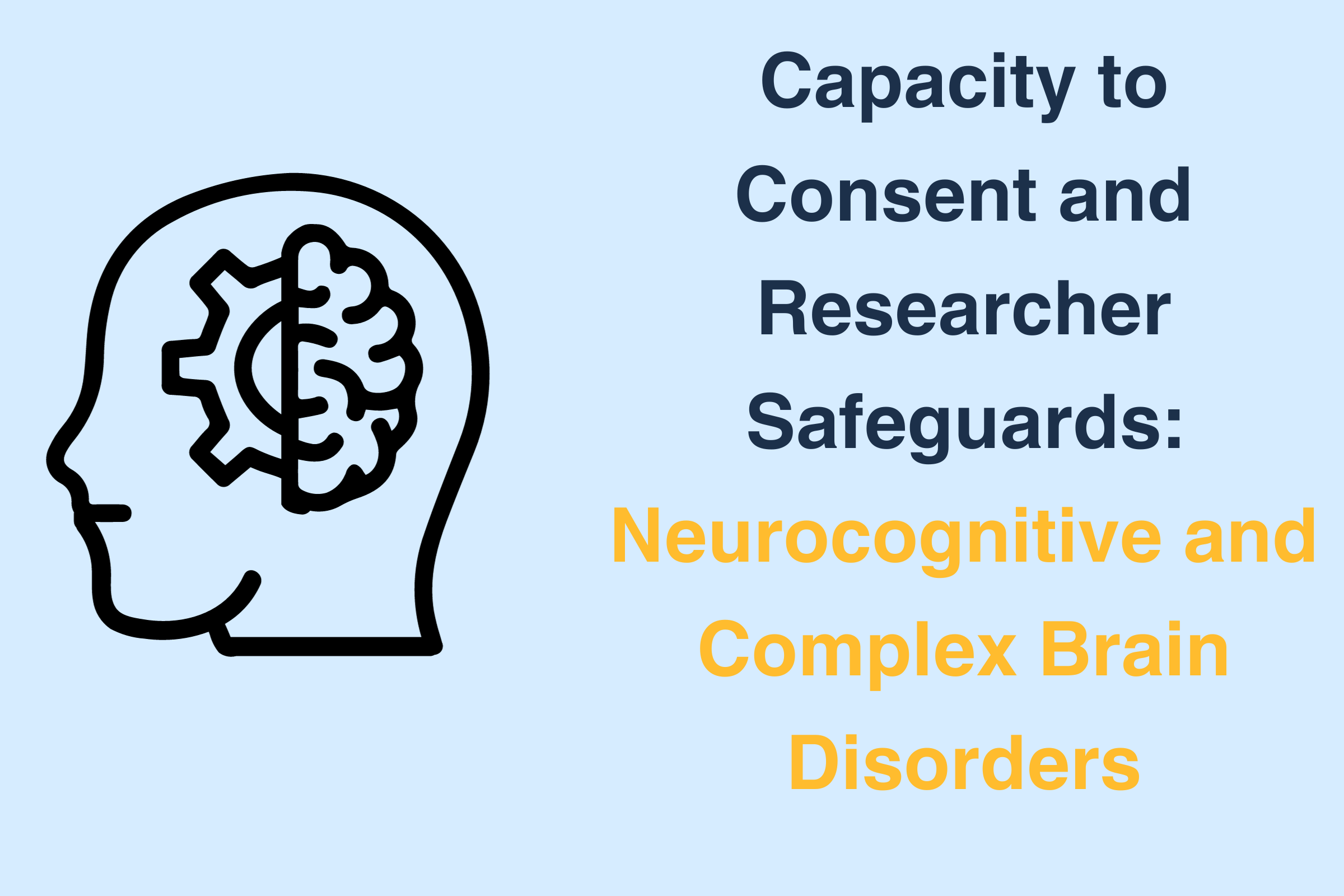A neurocognitive disorder is classified by a “decreased mental function due to a medical disease other than a psychiatric illness” (Mount Sinai Hospital, 2022).
Common disorders of this type include, but are not limited to, Alzheimer’s disease, Parkinson’s disease, and brain injuries caused by trauma. The level of mental function in individuals with such disorders range, and can change over time based on cognitive deterioration, or due to successful medical treatment.
In addition to neurocognitive disorders, individuals with complex brain disorders may have diminished capacity to consent. When individuals are undergoing an episode of psychosis, their normal thoughts and perceptions are disrupted, and they “may have difficulty recognizing what is real and what is not” (National Institute of Mental Health, 2023). For example, individuals with complex brain disorders such as schizophrenia or bipolar disorder have a high likelihood of suffering from psychosis. Thus, during these episodes of psychosis, such individuals may not be able to make informed decisions.
To further understand what occurs during a psychotic episode, in my role as a Research Writing and Ethics intern, I interviewed Dr. Lawrence Yang, chair of the department of social and behavioral sciences at New York University (NYU), and an adjunct professor at Columbia University Mailman School of Public Health.

Dr. Yang also leads the Culture, Stigma and Psychosis Lab, where I am a member. This lab focuses on “culturally-responsive prevention and intervention strategies that seek to address the challenges in reducing the stigma of marginalized conditions, including HIV and psychosis” (Yang, 2023).
Dr. Yang explained that when individuals are in an acute psychotic episode, they may experience hallucinations or delusions that blur the line between what is real and what is not. They may have a “fixed and false belief,” in which there is no reasoning capability. Without the ability to reason, one does not have the capacity to consent.
Individuals who experience psychosis are not always in this acute, symptomatic phase. In the early phases of a psychotic episode, individuals undergo a phase known as the prodrome. During this time there are gradual changes to an individual’s mood, thoughts, perceptions, behaviors and functioning level (Early Psychosis Intervention, 2023). During this phase they may have irritability, paranoia, feelings of disconnect, and other behavioral disturbances (Early Psychosis Intervention, 2023). However some of these symptoms “will persist without exacerbation” and may resolve on their own over time, but knowing when this will be the case is not clear, and more research is needed (Morris & Heinssen, 2014). In fact, research on the prodrome phase of psychosis is “essential” in understanding the biological mechanisms of psychosis (Morris & Heinssen 2014). “Prodrome in clinical medicine refers to the early symptoms and signs of illness preceding the characteristic manifestations” (George, Maheshwari, Chandran, Manohar, & Rao, 2017). Dr. Gaurav Patel, Assistant Professor in Clinical Psychiatry at Columbia University explained in an interview I conducted as part of my Research Writing & Ethics internship, that even if those in the prodrome are not necessarily detached from reality, there are other things that may interfere with their capacity for consent. In prodromes particularly, individuals may be having disturbing symptoms and feeling a lot of distress. Though they may not be in acute psychosis, they may be severely depressed or have other symptoms that interfere with their ability to appropriately assess and reason.
Do individuals have the capacity to consent when in the prodrome?
Existing empirical studies regarding decisional capacity in individuals with psychosis “suggest that most individuals who are at-risk for psychosis can adequately provide informed consent” (Morris & Heinssen, 2014). Dr. Yang explained that the reason that most individuals in the prodrome are usually able to consent is that in this phase they “still maintain their insight.” As a result, identifying and requesting informed consent from such individuals with this elevated risk “requires thoughtful communication about illness risk” and often involves participation of family or caregivers (Morris & Heinssen, 2014). Though there are reports from some large studies that suggest that most individuals who are at risk for psychosis are competent to provide consent, there is still variability in decisional capacity among those affected (Morris & Heinssnen, 2014).
Dr. Yang explained that a critically important part of assessing consent capability with populations who are at risk for psychosis is to have them engage in a feedback process, during which the potential research subjects explain back to you their understanding of the research process. (i.e., confidentiality & privacy, the research data collection process, the release of the research). For populations who are at risk for psychosis, Dr. Yang suggested researchers find a treating clinician who can evaluate the condition of the patient prior to study activities. In addition to treating clinician researchers may consult a patient caretaker or advocate, or someone who has solid clinical experience, to avoid any conflicts of interest.
Developing acute psychosis during the study does not mean that the participant will be unable to participate in the future, and when they are not in this phase they can be re-assessed for consent capacity in the future and be re-enrolled.
I asked both Dr. Yang and Dr. Patel what occurs if someone develops acute psychosis while already engaged in a study. Dr. Yang explained that if the participant starts to decompensate, they must be re-assessed for capacity, and if they cannot demonstrate it, they have to be withdrawn from the study. Dr. Patel echoed this statement, explaining that if someone is decompensating throughout the length of a study, one of the clinicians in the lab will do an assessment of their current psychiatric state, and with that, the researchers will respond with safety measures if there is a change in the participants cognitive capacity. Within the safety plan, researchers can contact family members or emergency professionals.
References
Early Psychosis Intervention (2023). Phases of Psychosis. British Columbia Early Psychosis Intervention Program. Retrieved October 25th, 2023 from https://www.earlypsychosis.ca/phases-of-psychosis/
George, M., Maheshwari, S., Chandran, S., Manohar, J. S., & Sathyanarayana Rao, T. S. (2017). Understanding the schizophrenia prodrome. Indian journal of psychiatry, 59(4), 505–509. https://doi.org/10.4103/psychiatry.IndianJPsychiatry_464_17
Morris, S. E., & Heinssen, R. K. (2014). Informed consent in the psychosis prodrome: ethical, procedural and cultural considerations. Philosophy, ethics, and humanities in medicine: PEHM, 9, 19. https://doi.org/10.1186/1747-5341-9-19
National Institute of Mental Health (2023). Understanding Psychosis (NIH Publication No. 23-MH-8110). U.S. Department of Health and Human Services, National Institutes of Health. Retrieved October 25th, 2023 from https://www.nimh.nih.gov/health/publications/understanding-psychosis
Neurocognitive disorder. Mount Sinai Health System. (n.d.). https://www.mountsinai.org/health-library/diseases-conditions/neurocognitive-disorder
